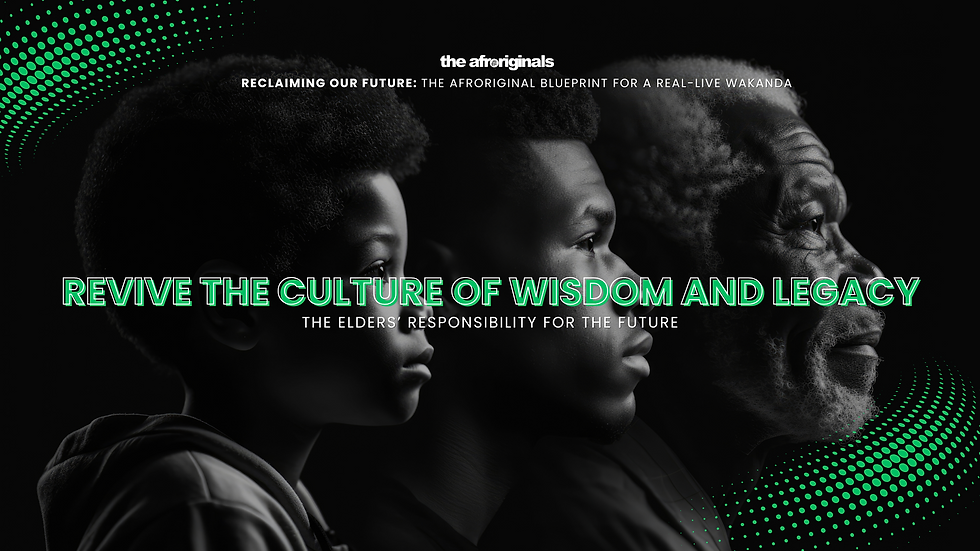Reclaiming Our Future: Revive the Culture of Wisdom and Legacy
- Tinashe Manolo

- Aug 8, 2025
- 4 min read

The clock is ticking.
Every sunrise we greet without passing the torch of wisdom is another day our future sits exposed to the same traps that captured our past. We live in an age of limitless information—videos, blogs, and online tutorials at our fingertips—yet the wisdom that transforms souls and steers nations is slowly fading into oblivion. And here’s the painful truth: it’s not fading because it’s forgotten. It’s fading because it’s being kept.
Our elders have stood in the heat of history. They’ve marched, fought, built, lost, rebuilt, and survived storms no textbook could hold. They have scars etched into their memories that tell of oppression endured, victories hard-won, and mistakes that cost dearly. They’ve learned lessons written not in ink but in blood, sweat, and tears. Yet many remain silent—by choice, by exhaustion, or by the belief that no one will listen.
But here’s the danger: while they remain quiet, the next generation is re-learning the same hard lessons the slow and brutal way—through trial, error, and unnecessary loss.
Silence is no longer acceptable. If you hold wisdom, you are not just encouraged—you are duty-bound—to pour it into the vessels coming behind you.
The Elders’ Responsibility to Speak & Act
Tell Your Story, Loud and Clear
Your story is not for vanity—it’s for preservation. Books, podcasts, recorded interviews, mentorship gatherings… every platform you can touch should carry your voice. Imagine a young Black entrepreneur avoiding a costly pitfall because an elder shared how they survived the same storm. Imagine a child standing tall because they know exactly whose shoulders they stand on. When you tell your story, you give those coming behind you a map and a compass in a world determined to see them lost.
Create Wisdom Circles
These should be sacred spaces—monthly gatherings where elders sit with the younger generation, not to preach, but to pass the keys to life: how to manage money, choose a life partner, navigate politics, protect health, and safeguard the community. These conversations must be rooted in love, free of condemnation, and steeped in the kind of guidance that says, I want you to win faster than I did.
Call Out Weak Leadership
Silence in the presence of failing leadership is a betrayal of the future. Elders have the authority and credibility to say, “This is not right” without fear of losing popularity. When leaders misuse their positions, elders must step forward—not to embarrass, but to correct. To stay quiet while the community’s foundation crumbles is to be complicit in its collapse.
Strategies to Keep Wisdom & Legacy Alive
Build Community Archives & Digital Libraries
Picture this: a vast, living collection that holds speeches, photographs, family histories, cultural traditions, and financial blueprints from Black innovators, leaders, and everyday heroes. Accessible to every child, student, and professional who seeks to know where they come from. Physical shelves for the local library, cloud-based platforms for the world—both working together to make sure our story never gets erased or rewritten.
Revive Oral Tradition
Oral tradition is more than storytelling—it’s time travel. It’s how a child in 2025 can know the heartbeat of 1965. Around kitchen tables, in barbershops, at family reunions, and in community halls, stories must flow again: tales of courage, mistakes, love, betrayal, survival, and success. These narratives teach values in a way no school curriculum can touch.
Mentor and Model with Intention
We cannot afford mentorship by accident. Leadership pipelines must be deliberate—matching young Black leaders with seasoned professionals who will not just teach skills, but model character. This means shadowing in boardrooms, working on real projects, and receiving feedback that shapes them into strong, ethical, and visionary leaders.
The Uncomfortable Truth
For decades, we’ve painted the antagonist in our story as something outside of us—an oppressive system, an unjust law, a faceless enemy. And those forces are real. But the quietest antagonist may have been us—our own inaction, our own unwillingness to pass on the tools, the knowledge, the cautionary tales.
Every time an elder decides, Let them figure it out for themselves, they leave the door wide open for history to repeat its worst chapters. Every time we bury wisdom in the grave instead of planting it in the living, we weaken the next harvest.
Others may be watching our decline, but it is our silence that scripts it.
Should we remain silent? No. Because silence today is the poverty, disunity, and defeat of tomorrow.
Steps to Success for our Community
Document & Publish – Record elder testimonies, historical accounts, and cultural lessons in books, videos, podcasts, and community newsletters. Make them widely accessible and free from gatekeeping.
Establish Wisdom Circles – Monthly gatherings in every community where intergenerational dialogue focuses on life mastery, history, and collective strategy.
Mentorship Networks – Structured systems where youth and emerging leaders are intentionally paired with experienced mentors who will train them in skill, mindset, and ethics.
Community Archives – Create hybrid physical-and-digital spaces to store our history, art, traditions, and successful strategies—open to all.
Oral Tradition Nights – Scheduled events in homes, schools, and cultural centers dedicated to passing down stories, proverbs, and family legacies.
Elder-Led Accountability Councils – Formal groups that monitor community leadership, ensuring transparency, ethics, and service to the people.
Legacy-Building Education – Integrate lessons on generational wealth, land ownership, governance, and cultural pride into after-school programs, churches, and community groups.




Comments